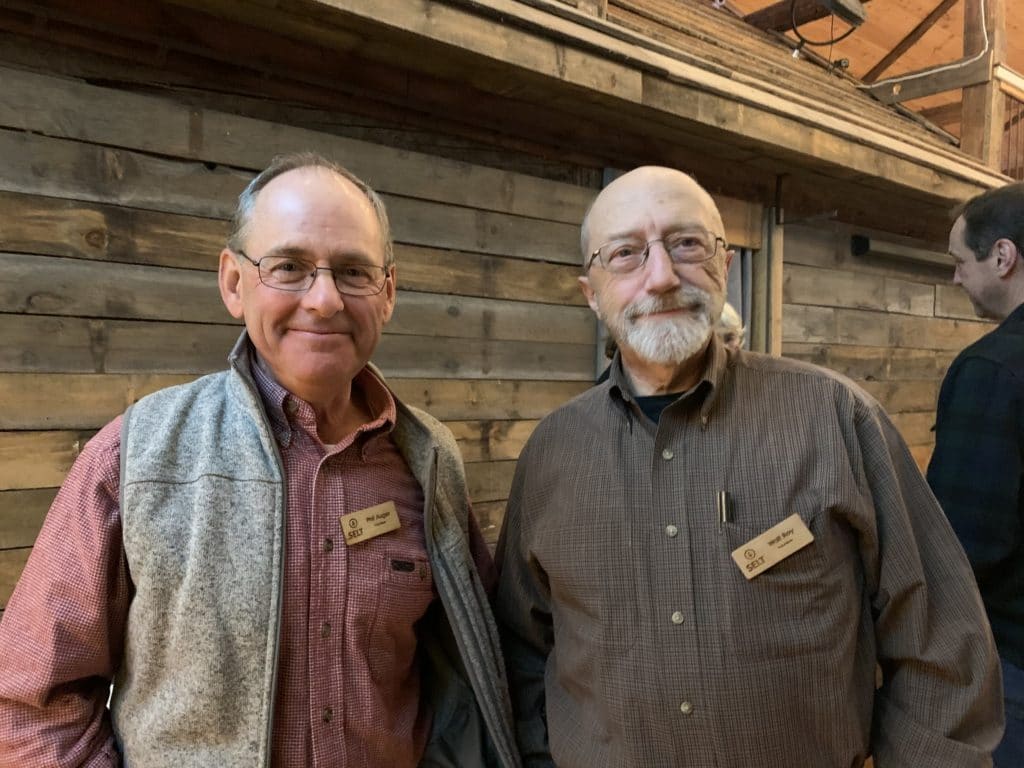By Brian Hart, SELT Executive Director
The Jack Heath Award is presented annually to recognize vision, leadership, and enduring support of conservation in SELT’s service area.
This year I have the privilege of presenting the award to someone so clearly deserving of this recognition. He has served in many capacities with many organizations, and all possible roles with SELT, as a Board member, staff member, volunteer, all along a donor as well. In fact, this year’s recipient was an early mentor in my land conservation career. But beyond his engagement with SELT, through his life’s work, he has educated thousands about open space, conservation, and much more. His career spans so long, that one friend joked he heard the state is going to replace the Old Man of the Mountain with a profile of Phil Auger.
As I started to work for the then Rockingham Land Trust in 2002, Phil was on the Board and working for UNH Cooperative Extension as County Forester, a job title that Phil would change to Land and Water Conservation Educator, a clear change of focus and priority for his work – and a recognition of the changing nature of southeastern New Hampshire. I have distinct memories of Phil, of course with a German shepherd as a companion, driving me around the County. It was a drive by lesson in landowners, conservation priorities, and land management, all rolled into one. Often I would receive a phone call from Phil – communicating that a landowner was ready – ready to start the conversation with SELT about conserving their land. Still today new conservation projects germinate every year at SELT, the seeds of their fruition planted years ago in conversations with Phil.

This is because Phil is gregarious, energetic, and well-liked, with an encyclopedic knowledge of landowners and land uses in our region. While Phil never really liked to talk about how difficult a project may be, his focus on getting it done certainly pushed us and others to complete projects that would otherwise not have been considered possible.
Knowing his impact was larger than just with SELT, we reached out to colleagues in other organizations to gain their insight and perspective.
What we heard about was Phil’s direct impact of creating, supporting, and inspiring conservation organizations. His friend Frank Mitchell reminded us that Phil joined with Frank to form Bear Paw Regional Greenways in 1995. The greenway vision central to Bear Paw intrigued many, including Cinny Wyatt of Branch Hill Farm, whom Phil and Frank encouraged to form another greenway organization. Just a few years, Cinny joined with others to create Moose Mountains Regional Greenways, and Phil volunteered his time to counsel and build a strong foundation for Moose Mountains. Today he is still active with both organizations that have collectively assisted in more than 17,000 acres of land being permanently protected.
But there is also the behind-the-scenes impact described as foundational work. Phil took the first GIS course offered at UNH (they did not say the year that was!) and used that new knowledge to co-author a natural resource inventory guide for NH. The result was a wave of inventories accompanied by conservation plans and, ultimately, more local conservation projects.
Phil also recognized that economic evidence can be very persuasive at the local decision -making level, bringing the “Cost of Community Services” methodology to New Hampshire. The results from his initial studies – that open space lands are most always a net gain for communities economically – challenged the conventional thinking of the time – that more development would always keep taxes down.
As Frank Mitchell relayed, “It’s hard to overestimate the impact this had on conservation in New Hampshire.”
We agree Frank; it would be a herculean effort to sum the acreage of lands that Phil has touched through his career but it is certainly in the tens of thousands. Where I stand today – Burley Farms – is just one example of dozens, representing the quiet, patient work Phil did over his decades of service; in this case, building relationships with a large family of more than 40 decision makers, ultimately leading to their decision to conserve their land, places that we now call Burley Farms, Burley Forest, and Haley Woods, more than 400 acres owned by SELT.
In closing, we could not agree more with the sentiments expressed by Jack Savage, President of the Forest Society, who summed up Phil’s impact succinctly.
“New Hampshire is a better place, and will be a better place in perpetuity, because of Phil Auger’s work.”
